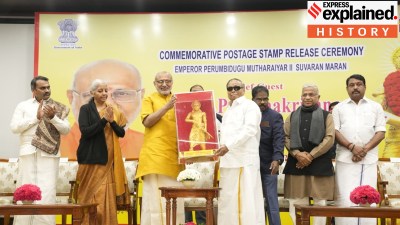South Block picks holes in military’s proposal on MoD
NEW DELHI, MARCH 11: As the restructuring of the Ministry of Defence (MoD) enters the final, proposal-whetting phase, bureaucrats in Sout...

NEW DELHI, MARCH 11: As the restructuring of the Ministry of Defence (MoD) enters the final, proposal-whetting phase, bureaucrats in South Block are questioning some of the recommendations made by the armed forces.
“We have picked holes in the armed forces’ proposals for them to clarify how some of them will aid or hinder functioning of the ministry,” said an MoD source.
Defence Minister George Fernandes has commissioned a cross-departmental study for restructuring the MoD. Proposals are to be submitted by the various headquarters and departments of the ministry and circulated among the others for their comments. These will then be put together to be finally formulated into a Cabinet note for Government approval.
The armed forces had submitted the proposals on integration and restructuring to the MoD’s Department of Defence, which has found faults with the suggestions, saying when “delegation of financial powers is being chalked out, and work in the MoD expected to diminish, the proposals are likely to create a bigger bureaucracy and problems of physical space in the Ministry”.
Proposals include the induction of Major General-level officers as Joint Secretaries. These officers are expected to replace the bureaucrats currently looking after the services’ cadre management and procurement offices. They are to be on deputation to the MoD as part of the joint staffing roles.
The MoD’s assessment of this proposal is that restructuring being governed by “the raison d’etre of independent analysis, the armed forces cannot be expected to fulfill these functions since they will continue to be governed by the various service regulations”. The MoD believes that the officers holding these posts will not be able to question or modify proposals that emanate from the service headquarters since they would come under the authority of the various chiefs.
“When intra-service procedures and specialisation are in themselves very complex, it is a bit too much to expect these officers — functioning as Joint Secretaries — to provide expertise across the board,” says an MoD source. “This will only result in symbolic representation, rather than the responsive organisation that is currently the requirement,” he adds.
On the procurement procedures and delays, the armed forces had suggested the setting up a defence procurement authority, which is, as the former Minister of State for Defence Arun Singh once stated, “tasked to procure against the specific unambiguous and written staff requirements” from the service headquarters. The procurement authority would also have an in-built pre-delivery inspection mechanism. The logic is to combine authority with accountability, which the current procedures lack.
The MoD points out that procurement planning boards are already functioning in the Army and the Air Force, and the Navy could constitute one as well. “Even as further streamlining is under consideration, and result-oriented structures already created, the armed forces proposal on the procurement authority is inappropriate,” says the source. “The proposals will create a much bigger and top-heavy bureaucracy. We should not be going for a mixture, but a compound with some strong chemistry,” he adds.
- 01
- 02
- 03
- 04
- 05































